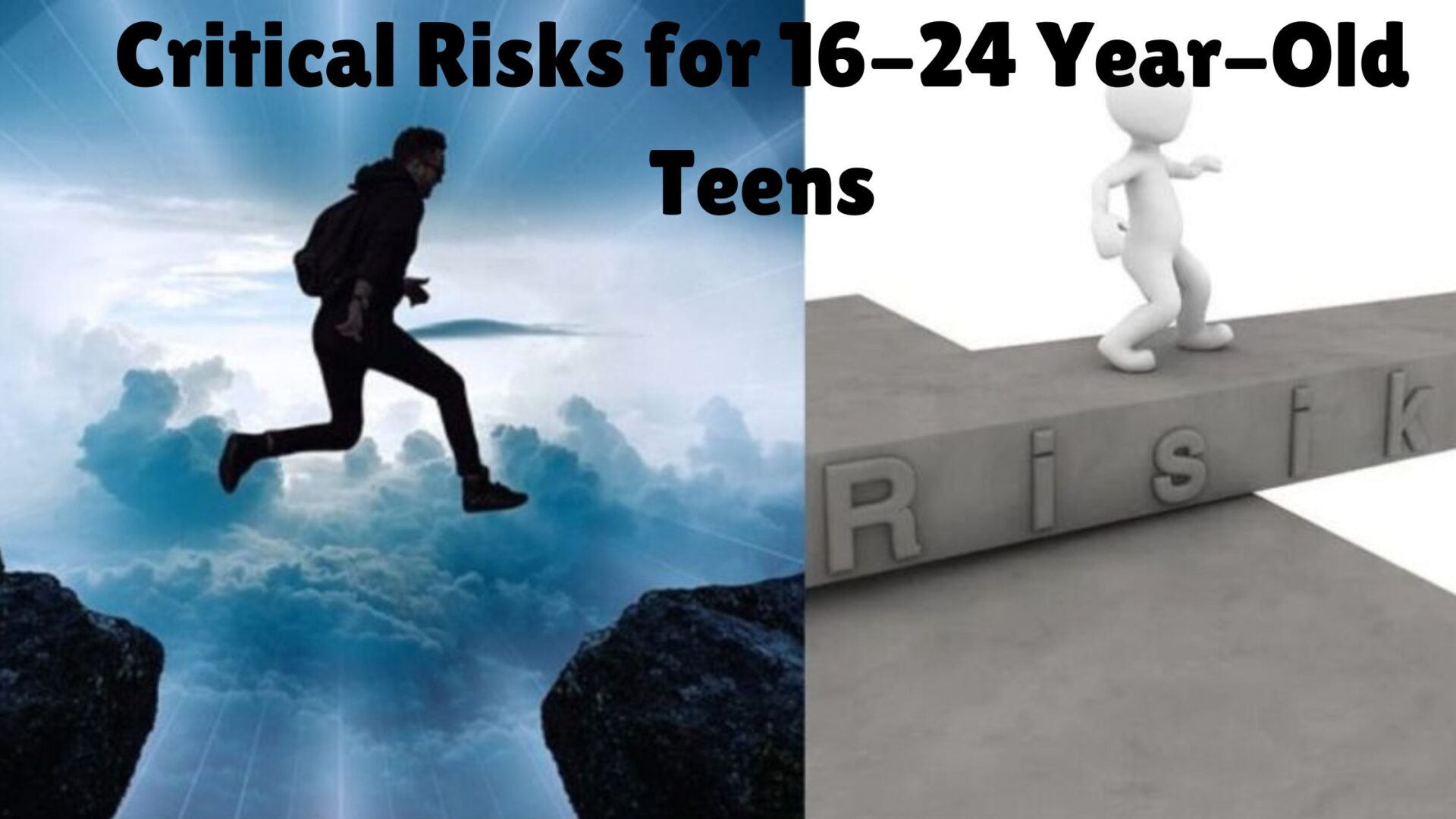Introduction:-
Critical Risks for 16-24 Year-Old Teens: What to Avoid

The teenage years are a period of growth, self-discovery, and exploration, but they can also be a time when young individuals face various challenges and risks. Adolescents between the ages of 16 and 24 are particularly vulnerable to certain risks that can have a lasting impact on their lives. In this article, we’ll delve into critical risks that 16-24 year-old teens should be aware of and avoid. Understanding these risks is essential for both teenagers and their parents or guardians.
What are the main critical risks faced by teens aged 16-24?
- Substance Abuse
One of the most prevalent risks that teenagers face is substance abuse. Experimentation with drugs and alcohol is common during this age range, and it can lead to a host of physical, emotional, and legal problems. Teens should be educated about the dangers of substance abuse and encouraged to make informed decisions regarding their health and well-being.
- Unsafe Driving
As teenagers gain the privilege of driving, they can be at risk of engaging in reckless behaviors on the road. Speeding, distracted driving, and driving under the influence of alcohol or drugs can lead to accidents, injuries, and even fatalities. Young drivers must be reminded of the importance of responsible and safe driving practices.
- Unsafe Relationships
Teenagers often start dating during this stage of life. It’s crucial for them to recognize the signs of unhealthy or abusive relationships. Education about consent, boundaries, and recognizing red flags in relationships is essential to prevent emotional and physical harm.
- Cyberbullying
In today’s digital age, cyberbullying is a significant concern for young people. Online harassment, bullying, and exposure to inappropriate content can harm a teenager’s mental well-being. Teens should be taught to be cautious online and to seek help if they become victims of cyberbullying.
- Mental Health Issues
Adolescence is a period of significant emotional development, and many teenagers experience mental health challenges such as anxiety and depression. It’s vital for 16-24 year-olds to understand the importance of seeking help when dealing with these issues and for parents and guardians to provide support.
- Unprotected Sex
Sexual activity can become a part of the teenage experience. It’s crucial for teenagers to have access to comprehensive sex education and understand the risks associated with unprotected sex, such as sexually transmitted infections and unplanned pregnancies.
- Financial Mismanagement
Many young adults are learning to manage their finances for the first time, and they may make poor financial decisions that could lead to debt or financial instability. Teaching financial literacy and responsible money management is essential to avoid future financial risks.
- Academic Underachievement
Some teenagers may struggle academically, which can limit their future opportunities. Encouraging good study habits, time management, and seeking help when needed can help prevent academic underachievement.
- Peer Pressure
Peer pressure can lead teenagers to make decisions that they wouldn’t otherwise make. Teaching teens to assert their boundaries, make informed choices, and surround themselves with supportive friends can help mitigate this risk.
- Legal Consequences
Engaging in risky behaviors like underage drinking, drug use, or criminal activities can lead to legal trouble. Understanding the potential legal consequences of these actions is essential for teenagers to avoid long-term repercussions.
Why are mental health issues prevalent among teens?
1. Academic Pressure
- High Expectations: Many teens face intense pressure to perform well academically to secure college admissions and scholarships.
- Workload: Heavy homework loads and the need to balance extracurricular activities can lead to stress and burnout.
2. Social Media
- Comparisons: Constant exposure to idealized images and lifestyles on social media can lead to feelings of inadequacy and low self-esteem.
- Cyberbullying: Online harassment and bullying can have severe psychological effects, including depression and anxiety.
3. Life Transitions
- Major Changes: Transitions such as moving from high school to college or entering the workforce can be stressful and overwhelming.
- Identity Exploration: This age group is often exploring and solidifying their identities, which can be a confusing and stressful process.
4. Family Dynamics
- Parental Pressure: High expectations from parents regarding academic and extracurricular achievements can contribute to stress.
- Family Issues: Divorce, financial instability, or other family conflicts can create an unstable and stressful environment for teens.
5. Peer Pressure
- Conformity: The desire to fit in with peers can lead to stress and anxiety, especially when teens feel they must conform to certain behaviors or standards.
- Bullying: Both traditional bullying and cyberbullying can have long-lasting impacts on mental health.
6. Biological Factors
- Hormonal Changes: The hormonal fluctuations during adolescence can contribute to mood swings and emotional instability.
- Brain Development: The brain continues to develop into the mid-20s, affecting emotional regulation and decision-making processes.
How to deal with spoiled teenagers aged 16 to 24? How to control them?
Dealing with spoiled teenagers aged 16 to 24 can be challenging, but it’s essential to foster a healthy and constructive environment for their personal growth. Controlling them is not the primary goal; instead, focus on guiding and supporting them. Here are some strategies to help:

- Open Communication: Maintain open and non-judgmental communication with your teenager. Encourage them to express their thoughts and feelings. Active listening can help them feel heard and understood.
- Set Clear Boundaries: Establish clear and reasonable rules and boundaries. Make sure your teenager knows the expectations regarding curfews, responsibilities, and behavior. Consistency is key.
- Be a Role Model: Demonstrate the behavior and values you want your teenager to adopt. They often learn by observing and emulating their parents or guardians.
- Encourage Responsibility: Gradually increase their responsibilities at home and in their personal lives. This can include chores, managing finances, or making decisions about their education and future.
- Teach Accountability: When they make mistakes, help them understand the consequences of their actions. Encourage them to take responsibility for their choices.
- Offer Guidance, Not Control: Rather than trying to control them, provide guidance and support. Discuss the potential consequences of their decisions and help them make informed choices.
- Foster Independence: Encourage their independence and decision-making skills. It’s important for them to learn how to solve problems and make choices on their own.
- Encourage Self-Reflection: Help them develop self-awareness by asking questions that promote self-reflection. Ask about their goals, values, and how their actions align with their aspirations.
- Provide Positive Reinforcement: Acknowledge and praise their achievements and good behavior. Positive reinforcement can be a powerful motivator.
- Seek Professional Help: If their behavior becomes extreme or unmanageable, consider seeking the assistance of a therapist, counselor, or support group. Professional guidance can be beneficial for both the teenager and the family.
- Empathy and Patience: Understand that teenagers go through a period of self-discovery and growth. Be empathetic and patient while they navigate these challenges.
- Encourage Education: Stress the importance of education and its role in their future. Help them set educational and career goals and offer support in achieving them.
- Spend Quality Time: Spend quality time with your teenager. Building a strong, positive relationship can have a significant impact on their behavior and choices.
- Avoid Power Struggles: Try to avoid unnecessary power struggles. Instead, focus on finding compromises and solutions that respect their autonomy while ensuring their safety and well-being.
Remember that each teenager is unique, and what works for one may not work for another. It’s crucial to adapt your approach to their individual needs and circumstances. Patience, understanding, and a loving approach can go a long way in helping teenagers transition into responsible and self-reliant adults.
Conclusion
Navigating the teenage years can be challenging, but awareness of the critical risks that 16-24 year-old teens should avoid is a crucial step in ensuring their safety and well-being. Parents, guardians, educators, and the community at large must play a role in educating and supporting teenagers during this transformative stage of life. By addressing these risks head-on and providing guidance, we can empower young adults to make informed decisions and lead healthier, more secure lives as they transition into adulthood.
FAQs:
1. How can substance abuse affect teens?
Substance abuse can lead to:
- Health Problems: Long-term damage to organs, especially the brain.
- Addiction: Difficulty in controlling substance use, leading to dependency.
- Poor Decision-Making: Increased risk of engaging in risky behaviors.
2.. What are the contributing factors to automobile accidents among teens?
Contributing factors include:
- Inexperience: Less driving experience can lead to poor judgment and mistakes.
- Risky Behaviors: Speeding, not wearing seat belts, and distracted driving.
- Impaired Driving: Driving under the influence of alcohol or drugs.
3. How does violence impact teens?
Violence can lead to:
- Physical Injuries: Immediate harm or long-term disability.
- Psychological Trauma: Anxiety, depression, and PTSD.
- Academic and Social Issues: Poor academic performance and social isolation.
4. What sexual health risks are common for teens?
Common risks include:
- STIs: Such as HIV, chlamydia, and gonorrhea.
- Unintended Pregnancies: Leading to potential health risks and socioeconomic challenges.
- Psychological Impact: Stress and anxiety related to sexual health issues.
5. What steps can teens take to mitigate these risks?
Teens can mitigate risks by:
- Seeking Help: Accessing mental health resources and talking to trusted adults.
- Education: Learning about the dangers of substance abuse and practicing safe driving.
- Healthy Relationships: Building respectful and supportive relationships.
- Safe Practices: Using protection during sex and getting regular health check-ups.
References
- Mental Health America. (2024). Mental Health in Teens and Young Adults. Retrieved from Mental Health America.
- National Institute on Drug Abuse. (2024). Preventing Drug Use among Children and Adolescents. Retrieved from NIDA.
- Centers for Disease Control and Prevention. (2024). Teen Drivers: Get the Facts. Retrieved from CDC.
- American Psychological Association. (2024). Understanding Youth Violence. Retrieved from APA.
- World Health Organization. (2024). Sexual and Reproductive Health. Retrieved from WHO.






